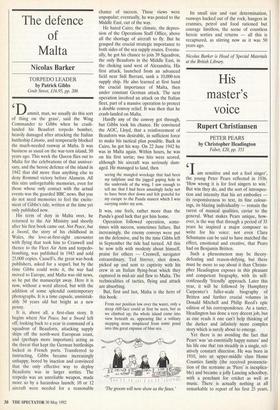The defence of Malta
Nicolas Barker
TORPEDO LEADER
by Patrick Gibbs Grub Street, £16.95, pp. 206 `Dammit, man, we usually do this sort of thing on the grass', said the Wing Commander to Gibbs when he crash- landed his Beaufort torpedo bomber, heavily damaged after attacking the Italian battleship Littorio, and temporarily blocked the much-needed runway at Malta. It was business as usual on the war-torn island, 50 years ago. This week the Queen flies out to Malta for the celebrations of that anniver- sary, and the heroic defence of the island in 1942 that did more than anything else to deny Rommel victory before Alamein. All this stirs unforgettable memories, even for those whose only contact with the actual events was the guarded BBC news. But you do not need memories to feel the excite- ment of Gibbs's tale, written at the time yet only published now.
His term of duty in Malta over, he returned to the Air Ministry and shortly after his first book came out. Not Peace, but a Sword, the story of his childhood in Wales, the love-at-first-sight encounter with flying that took him to Cranwell and thence to the Fleet Air Arm and torpedo- bombing, was published in 1943 and sold 25,000 copies. Cassell's, the great war-book publishers, asked for a sequel, but by the time Gibbs could write it, the war had moved to Europe, and Malta was old news, so he put the manuscript away. Here it is now, without a word altered, but with the addition of some splendid contemporary photographs. It is a time capsule, unmistak- ably 50 years old but bright as a new penny.
It is, above all, a first-class story. It begins where Not Peace, but a Sword left off, looking back to a year in command of a squadron of Beauforts, attacking supply ships off the north-west European coast, and (perhaps more important) acting as the threat that kept the German battleships locked in French ports. Transferred to instructing, Gibbs became increasingly unhappy, bored by inaction and convinced that the only effective way to deploy Beauforts was in larger sorties. The torpedo was an unreliable weapon, made more so by a hazardous launch; 10 or 12 aircraft were needed for a reasonable
chance of success. These views were unpopular; eventually, he was posted to the Middle East, out of the way.
He hated Cairo, the climate, the depres- sion of the Operations Staff Office, above all the shortage of aircraft to fly. But he grasped the crucial strategic importance to both sides of the sea supply routes. Eventu- ally, he got his chance to join 39 Squadron, the only Beauforts in the Middle East, in the choking sand west of Alexandria. His first attack, launched from an advanced field near Sidi Barrani, sank a 10,000-ton supply ship. He also learned at first hand the crucial importance of Malta, then under constant German attack. The next operation involved an attack on the Italian fleet, part of a massive operation to protect a double convoy relief. It was then that he crash-landed on Malta.
Hardly any of the convoy got through, but Gibbs took his chance. He convinced the AOC, Lloyd, that a reinforcement of Beauforts was desirable, in sufficient force to make his tactical plan possible. Back in Cairo, he got his way. On 22 June 1942 he was in Malta again. Within hours, he was on his first sortie; two hits were scored, although his aircraft was seriously dam- aged. He managed to land, then
seeing the mangled wreckage that had been my tailplane and the jagged gaping hole in the underside of the wing, I saw enough to tell me that I had been amazingly lucky not to have been shot down and felt grateful for my escape to the Panda mascot which I was carrying under my arm.
It was, one feels, rather more than the Panda's good luck that got him home.
Operation followed operation, some- times with success, sometimes failure. But increasingly, the enemy convoys were put on the defensive, and by the time Gibbs left in September the tide had turned. All this he now tells with modesty about himself, praise for others — Creswell, navigator extraordinary, Ted Strever, shot down, picked up and sent to captivity with his crew in an Italian flying-boat which they captured in mid-air and flew to Malta. The technicalities of tactics, flying and attack are absorbing.
But, first and last, Malta is the hero of this book:
From our position low over the water, only a steep cliff-face could at first be seen, but as we climbed up, the whole island came into view beneath us, appearing like a solitary stepping stone misplaced from some pond into this great expanse of blue sea.
'The groom will now show us the faxes.' Its small size and vast determination, runways hacked out of the rock, hangers in crannies, petrol and food rationed but courage limitless, the scene of countless heroic sorties and returns — all this is recaptured, as stirring now as it was 50 years ago.
Nicolas Barker is Head of Special Materials at the British Library.
















































 Previous page
Previous page